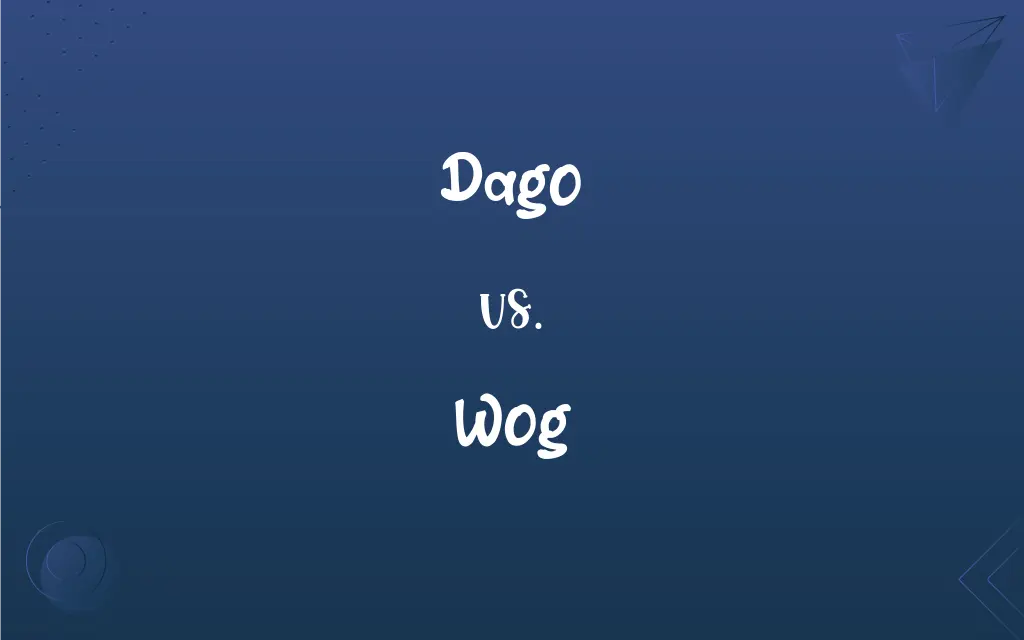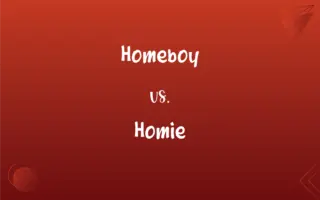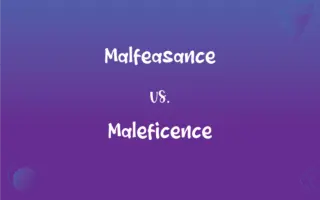Dago vs. Wog: What's the Difference?
By Harlon Moss & Aimie Carlson || Updated on May 23, 2024
"Dago" is a derogatory term historically used for people of Italian, Spanish, or Portuguese descent, while "Wog" is an offensive term used in the UK and Australia for people of Mediterranean, Middle Eastern, or South Asian descent.

Key Differences
"Dago" is a racial slur used predominantly in the United States to refer to individuals of Italian, Spanish, or Portuguese heritage. It originated in the 19th century and carries a highly offensive connotation. The term reflects ethnic and racial prejudices that were prevalent during that era. "Wog" is a pejorative term used primarily in the United Kingdom and Australia to describe people from Mediterranean, Middle Eastern, or South Asian backgrounds. It is similarly offensive and reflects xenophobic attitudes. The term gained traction in the early 20th century and is linked to colonial and post-colonial racial hierarchies.
Both "Dago" and "Wog" serve as examples of racial slurs that target specific ethnic groups, reinforcing negative stereotypes and social marginalization. "Dago" was mainly directed at Southern Europeans, whereas "Wog" was used more broadly against non-Anglo-Saxon people, including those from the Middle East and South Asia.
The usage of these terms underscores historical and systemic racism. "Dago" was often used by Americans during periods of high immigration from Southern Europe, while "Wog" reflects the British colonial mindset and post-war immigration waves.
In contemporary times, both terms are considered highly offensive and are generally avoided in polite discourse. They serve as reminders of the prejudices faced by different ethnic groups and the need for cultural sensitivity and respect in language.
Comparison Chart
Origin
United States
United Kingdom, Australia
ADVERTISEMENT
Targeted Ethnicities
Italian, Spanish, Portuguese
Mediterranean, Middle Eastern, South Asian
Historical Context
19th-century immigration
Colonial and post-colonial periods
Usage Regions
Mainly the United States
Mainly the UK and Australia
Contemporary Status
Highly offensive, avoided
Highly offensive, avoided
Dago and Wog Definitions
Dago
An offensive term for a Spanish individual.
He faced discrimination being called a 'Dago' because of his Spanish roots.
ADVERTISEMENT
Wog
A racial slur for people of Mediterranean descent.
Using 'Wog' to describe someone is deeply insulting and racist.
Dago
Historically used in the U.S. to demean Southern Europeans.
The immigrants were unfairly labeled as 'Dagos' upon their arrival.
Wog
An offensive term for Middle Eastern individuals.
He was derogatorily called a 'Wog' due to his Middle Eastern heritage.
Dago
Used pejoratively for Portuguese people.
Referring to someone as a 'Dago' is hurtful and derogatory.
Wog
Used pejoratively for South Asians.
The term 'Wog' is a harmful and discriminatory label for South Asians.
Dago
A derogatory term for an Italian person.
Calling someone a 'Dago' is incredibly offensive and inappropriate.
Wog
Reflects British colonial racial attitudes.
The term 'Wog' has colonial connotations and is deeply offensive.
Dago
An ethnic slur reflecting prejudice against Italians.
The term 'Dago' is rooted in racial and ethnic bigotry.
Wog
Commonly used in the UK to demean non-Anglo-Saxon people.
The use of 'Wog' in any context is unacceptable and offensive.
Dago
Used as a disparaging term for a person of Italian, Spanish, or Portuguese descent.
Wog
Used as a disparaging term for a person of color, especially a person from northern Africa or western or southern Asia.
Dago
A person of Italian, Spanish, Portuguese, Greek, or other Mediterranean descent.
Wog
Any person who looks in-between "white" and "black": originally specifically an Indian, but later also broadened to anybody of Middle Eastern or Mediterranean descent.
Dago
A person of Italian descent.
Wog
Specifically someone of Mediterranean descent; the word does not really have an "Indian" connotation in Australia.
Dago
A nickname given to a person of Spanish (or, by extension, Portuguese or Italian) descent.
Wog
Abbreviation of polliwog
Dago
Offensive terms for a person of Italian descent
Wog
A pollywog, or sailor who has never crossed the Equator.
Wog
A bug, an insect.
Wog
A minor illness caused by bacteria, virus, intestinal parasite, etc.
Wog
A toy insect in parts that can be assembled, used in fund-raising games.
Wog
(Scientology) A person who is not a Scientologist.
Wog
(Of soldiers stationed abroad) to sell something, especially illicit or stolen goods, to the local inhabitants.
Wog
To steal.
Wog
An offensive slang term used by the British to refer to people of color from Africa or Asia
FAQs
What does "Dago" mean?
"Dago" is a derogatory term for people of Italian, Spanish, or Portuguese descent.
Is "Dago" still used today?
It is highly offensive and generally avoided in modern language.
Why are these terms offensive?
They perpetuate negative stereotypes and reflect historical prejudices.
What is the historical context of "Dago"?
It was used during periods of high immigration from Southern Europe to the U.S.
What is the origin of "Dago"?
It originated in the 19th century in the United States.
Who is targeted by the term "Wog"?
"Wog" targets people of Mediterranean, Middle Eastern, or South Asian descent.
Where is "Wog" commonly used?
It is primarily used in the United Kingdom and Australia.
What is the historical context of "Wog"?
It reflects colonial and post-colonial racial attitudes in the UK and Australia.
What are alternative terms to use instead of "Wog"?
Use respectful and accurate terms for someone's ethnic or national background.
Are "Dago" and "Wog" similar?
Both are racial slurs targeting specific ethnic groups and are highly offensive.
How should someone respond if called a "Wog"?
They should acknowledge it as a racial slur and seek to educate or address the offense.
Are there legal implications for using "Dago"?
Using racial slurs can lead to harassment charges or other legal consequences in some contexts.
How can society discourage the use of these terms?
Through education, promoting cultural sensitivity, and addressing prejudiced behavior.
Can these terms be used in a non-offensive way?
No, they are inherently offensive and should be avoided.
How should someone respond if called a "Dago"?
They should recognize it as an offensive slur and address the discrimination appropriately.
Why do such terms persist in some cultures?
They persist due to historical prejudices and lack of awareness or education.
How can one educate others about the offensiveness of these terms?
Through open discussions, educational programs, and promoting inclusive language.
What are alternative terms to use instead of "Dago"?
Simply refer to individuals by their actual nationality or ethnicity without derogatory terms.
Are there legal implications for using "Wog"?
Similarly, using such offensive language can have legal repercussions depending on the context.
What impact do these terms have on those targeted?
They can cause psychological harm, perpetuate discrimination, and reinforce social marginalization.
About Author
Written by
Harlon MossHarlon is a seasoned quality moderator and accomplished content writer for Difference Wiki. An alumnus of the prestigious University of California, he earned his degree in Computer Science. Leveraging his academic background, Harlon brings a meticulous and informed perspective to his work, ensuring content accuracy and excellence.
Co-written by
Aimie CarlsonAimie Carlson, holding a master's degree in English literature, is a fervent English language enthusiast. She lends her writing talents to Difference Wiki, a prominent website that specializes in comparisons, offering readers insightful analyses that both captivate and inform.































































